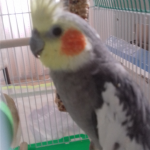Is it possible this is a bad bag? Definitely talk with the vet about this.
My dogs lipstick is out and I need to help him get it back in
Comments
My almost 7 year old Puggle Minnie has started throwing up after she has food or a snack. She has been on the same food all her life and the same snacks too. This throwing up just started on Sunday of this week (July 23rd). She also recently started hiding under the bed in the mornings because she doesn’t want to go out. I have an appointment with her vet on Friday but I am worried and wondered if anyone had any suggestions or thoughts. Thank you!
Comments
-
Anonymous -
Carrie Deitz Thank you. No diarrhea. My husband just told me that she did eat her food late last night with no issues. We aren’t giving her snacks since that seems to be the trigger. We have an appointment with the vet tomorrow. I appreciate you responding!
-
Carrie Deitz Thank you, I will.
-
Anonymous After the vet, I was going to encourage an elimination diet to figure out the trigger. Stick to high quality treats from now on. 🙂 Good luck!
How long should you wait to play with a boxer puppy (almost 8mos old) after they eat? I’ve read about bloat and am trying to nail down our morning routine.
Comments
We just got a cockatiel and he doesnt move so much he rarely eats/drinks and when i get near him he starts shaking i guess he is 6 months old what can go wrong?
my dog has been limping for 3 days now does not want to put weight on her left front paw and her left back paw gives out and she seems to be moving to one side and falls she is not herself and just wants to sleep.
Comments
my dog has been limping for 3 days now does not want to put weight on her left front paw and her left back paw gives out and she seems to be moving to one side and falls she is not herself and just wants to sleep.
Comments
My cat just recently lost her kittens when they ran away on the Fourth of July. Now she’s hardly eating and she’s shedding massive amounts of fur. She’s not taking good care of herself and seems lost all the time. Is there anything I can do?
I can see something popng out of my dog’s ryt eye..I took her to a dog’s clinic and they said it’s okay… but I think it’s troubling her. She is 10 year old
Comments
My foster kitten has really bad diarrhea and we have tried everything.











Hello,
I think the best way is to see a vet for an injectable sedative. The other option is to keep the penis lubricated with sterile KY jelly and wait until the tissue relaxes on its own. Protecting against self mutilation and trauma along with drying is imperative. Please also neuter your dog.